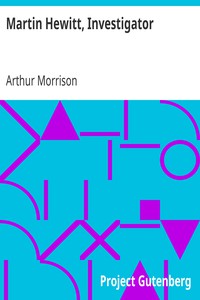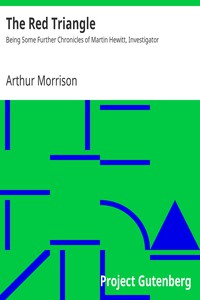Martin Hewitt, Investigator, Arthur Morrison [i like reading txt] 📗

- Author: Arthur Morrison
Book online «Martin Hewitt, Investigator, Arthur Morrison [i like reading txt] 📗». Author Arthur Morrison
Claridge's face worked painfully. Once or twice he appeared to be on the point of returning an indignant reply, but hesitated, and finally broke down altogether.
"Don't expose me, Mr. Hewitt!" he pleaded; "I beg you won't expose me! I haven't harmed a soul but myself. I've paid Lord Stanway every penny back, and I never knew the thing was a forgery till I began to clean it. I'm an old man, Mr. Hewitt, and my professional reputation has been spotless until now. I beg you won't expose me."
Hewitt's voice softened. "Don't make an unnecessary trouble of it," he said. "I see a decanter on your sideboard—let me give you a little brandy and water. Come, there's nothing criminal, I believe, in a man's breaking open his own desk, or his own trap-door, for that matter. Of course I'm acting for Lord Stanway in this affair, and I must, in duty, report to him without reserve. But Lord Stanway is a gentleman, and I'll undertake he'll do nothing inconsiderate of your feelings, if you're disposed to be frank. Let us talk the affair over; tell me about it."
"It was that swindler Hahn who deceived me in the beginning," Claridge said. "I have never made a mistake with a cameo before, and I never thought so close an imitation was possible. I examined it most carefully, and was perfectly satisfied, and many experts examined it afterward, and were all equally deceived. I felt as sure as I possibly could feel that I had bought one of the finest, if not actually the finest, cameos known to exist. It was not until after it had come back from Lord Stanway's, and I was cleaning it the evening before last, that in course of my work it became apparent that the thing was nothing but a consummately clever forgery. It was made of three layers of molded glass, nothing more nor less. But the glass was treated in a way I had never before known of, and the surface had been cunningly worked on till it defied any ordinary examination. Some of the glass imitation cameos made in the latter part of the last century, I may tell you, are regarded as marvelous pieces of work, and, indeed, command very fair prices, but this was something quite beyond any of those.
"I was amazed and horrified. I put the thing away and went home. All that night I lay awake in a state of distraction, quite unable to decide what to do. To let the cameo go out of my possession was impossible. Sooner or later the forgery would be discovered, and my reputation—the highest in these matters in this country, I may safely claim, and the growth of nearly fifty years of honest application and good judgment—this reputation would be gone forever. But without considering this, there was the fact that I had taken five thousand pounds of Lord Stanway's money for a mere piece of glass, and that money I must, in mere common honesty as well as for my own sake, return. But how? The name of the Stanway Cameo had become a household word, and to confess that the whole thing was a sham would ruin my reputation and destroy all confidence—past, present, and future—in me and in my transactions. Either way spelled ruin. Even if I confided in Lord Stanway privately, returned his money, and destroyed the cameo, what then? The sudden disappearance of an article so famous would excite remark at once. It had been presented to the British Museum, and if it never appeared in that collection, and no news were to be got of it, people would guess at the truth at once. To make it known that I myself had been deceived would have availed nothing. It is my business not to be deceived; and to have it known that my most expensive specimens might be forgeries would equally mean ruin, whether I sold them cunningly as a rogue or ignorantly as a fool. Indeed, my pride, my reputation as a connoisseur, is a thing near to my heart, and it would be an unspeakable humiliation to me to have it known that I had been imposed on by such a forgery. What could I do? Every expedient seemed useless but one—the one I adopted. It was not straightforward, I admit; but, oh! Mr. Hewitt, consider the temptation—and remember that it couldn't do a soul any harm. No matter who might be suspected, I knew there could not possibly be evidence to make them suffer. All the next day—yesterday—I was anxiously worrying out the thing in my mind and carefully devising the—the trick, I'm afraid you'll call it, that you by some extraordinary means have seen through. It seemed the only thing—what else was there? More I needn't tell you; you know it. I have only now to beg that you will use your best influence with Lord Stanway to save me from public derision and exposure. I will do anything—pay anything—anything but exposure, at my age, and with my position."
"Well, you see," Hewitt replied thoughtfully, "I've no doubt Lord Stanway will show you every consideration, and certainly I will do what I can to save you in the circumstances; though you must remember that you have done some harm—you have caused suspicions to rest on at least one honest man. But as to reputation, I've a professional reputation of my own. If I help to conceal your professional failure, I shall appear to have failed in my part of the business."
"But the cases are different, Mr. Hewitt. Consider. You are not expected—it would be impossible—to succeed invariably; and there are only two or three who know you have looked into the case. Then your other conspicuous successes——"
"Well, well, we shall see. One thing I don't know, though—whether you climbed out of a window to break open the trap-door, or whether you got up through the trap-door itself and pulled the bolt with a string through the jamb, so as to bolt it after you."
"There was no available window. I used the string, as you say. My poor little cunning must seem very transparent to you, I fear. I spent hours of thought over the question of the trap-door—how to break it open so as to leave a genuine appearance, and especially how to bolt it inside after I had reached the roof. I thought I had succeeded beyond the possibility of suspicion; how you penetrated the device surpasses my comprehension. How, to begin with, could you possibly know that the cameo was a forgery? Did you ever see it?"
"Never. And, if I had seen it, I fear I should never have been able to express an opinion on it; I'm not a connoisseur. As a matter of fact, I didn't know that the thing was a forgery in the first place; what I knew in the first place was that it was you who had broken into the house. It was from that that I arrived at the conclusion, after a certain amount of thought, that the cameo must have been forged. Gain was out of the question. You, beyond all men, could never sell the Stanway Cameo again, and, besides, you had paid back Lord Stanway's money. I knew enough of your reputation to know that you would never incur the scandal of a great theft at your place for the sake of getting the cameo for yourself, when you might have kept it in the beginning, with no trouble and mystery. Consequently I had to look for another motive, and at first another motive seemed an impossibility. Why should you wish to take all this trouble to lose five thousand pounds? You had nothing to gain; perhaps you had something to save—your professional reputation, for instance. Looking at it so, it was plain that you were suppressing the cameo—burking it; since, once taken as you had taken it, it could never come to light again. That suggested the solution of the mystery at once—you had discovered, after the sale, that the cameo was not genuine."
"Yes, yes—I see; but you say you began with the knowledge that I broke into the place myself. How did you know that? I can not imagine a trace——"
"My dear sir, you left traces everywhere. In the first place, it struck me as curious, before I came here, that you had sent off that check for five thousand pounds to Lord Stanway an hour or so after the robbery was discovered; it looked so much as though you were sure of the cameo never coming back, and were in a hurry to avert suspicion. Of course I understood that, so far as I then knew the case, you were the most unlikely person in the world, and that your eagerness to repay Lord Stanway might be the most creditable thing possible. But the point was worth remembering, and I remembered it.
"When I came here, I saw suspicious indications in many directions, but the conclusive piece of evidence was that old hat hanging below the trap-door."
"But I never touched it; I assure you, Mr. Hewitt, I never touched the hat; haven't touched it for months——"
"Of course. If you had touched it, I might never have got the clue. But we'll deal with the hat presently; that wasn't what struck me at first.





Comments (0)